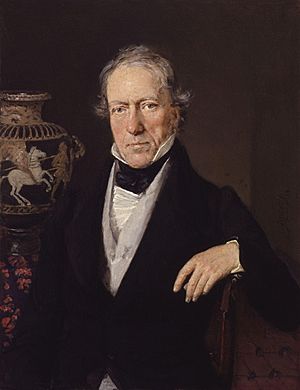William Martin Leake facts for kids
Quick facts for kids
William Martin Leake
|
|
|---|---|

William Martin Leake
portrayed by Christian Albrecht Jensen |
|
| Born | 14 January 1777 Mayfair, London |
| Died | 6 January 1860 (aged 82) Brighton |
| Title | FRS, DCL |
| Nationality | English |
William Martin Leake (born January 14, 1777 – died January 6, 1860) was an English military officer, mapmaker, diplomat, and expert on ancient things. He was also a writer and a member of the Royal Society.
He spent a lot of his time in the British military, especially around the Mediterranean Sea. During his travels, he became very interested in the geography and cultures of the places he visited. He wrote many books, mostly about Greece.
Contents
His Early Life and Military Career
William Martin Leake was born in London. After finishing school at the Royal Military Academy, Woolwich, he became an officer in the Royal Regiment of Artillery in 1794.
He spent four years in the West Indies as a marine artillery officer. In 1799, he was sent to Constantinople (now Istanbul) to help train the army of the Ottoman Empire. Britain wanted to help the Ottomans defend themselves against Napoleonic France.
Adventures and Discoveries
In 1800, William traveled through Asia Minor (modern-day Turkey) to meet the British fleet in Cyprus. This trip sparked his interest in studying ancient places and their geography.
In 1801, he traveled across the desert with the Turkish army to Egypt. After the French were forced out of Egypt, he helped map the Nile valley. However, he lost all his maps and notes when the ship carrying the Elgin marbles sank near Cerigo in Greece.
Soon after, he was sent to map the coasts of Albania and the Morea (a part of Greece). This was to help the Turks against possible French attacks. He used this chance to collect valuable ancient coins and writings, and to explore old historical sites.
Diplomatic Missions and Retirement
In 1807, a war started between Turkey and England. William was captured in Salonica, but he was released that same year. He was then sent on a special mission to Ali Pasha of Ioannina, a powerful ruler. William earned Ali Pasha's trust and stayed with him for over a year as Britain's representative.
In 1810, he received a yearly payment for his important work in Turkey. In 1815, he left the army as a colonel. For the rest of his life, he focused on studying geography and ancient history. He became a Fellow of the Royal Society in 1815.
He passed away in Steyning, Sussex, on January 6, 1860. The ancient marbles he collected in Greece were given to the British Museum. After his death, the University of Cambridge bought his collection of bronzes, vases, gems, and coins. These are now kept at the Fitzwilliam Museum.
William Martin Leake was also a member of the Royal Geographical Society. He received an honorary degree from Oxford in 1816. He was also a member of the German Academy of Sciences Berlin and a correspondent for the Institute of France.
His Books and Writings
William Martin Leake wrote several important books about his travels and studies:
- Researches in Greece (1814)
- The topography of Athens: With some remarks on its antiquities (1821)
- Journal of a tour in Asia Minor,: with comparative remarks on the ancient and modern geography of that country (1824)
- Travels in the Morea: With a map and plans (1830), and a follow-up book called Peloponnesiaca (1846)
- Travels in Northern Greece (1835)
- Numismata Hellenica (1854), with an update in 1859.
His book Topography of Athens was the first to study Athens in a very organized way. It was considered an important source of information for a long time.

